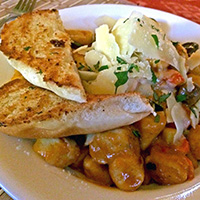OBJECTIVES The reasons you should read this article are:
|
The University of Chicago Settlement (1901)
This excerpt of the first 15 pages from this description of a settlement house will give you a sense of Mary McDowell’s writing style and the typical work of settlement houses in her era.
HISTORY.
THE University of Chicago Settlement was established in 1894 by the Philanthropic Committee of the Christian Union of the University of Chicago, and was incorporated in 1898.
The Settlement began life in one small rear flat, with a small store-room in front, which was club-room, play-room, and general auditorium. Two fellows of the Department of Sociology of the University were the first residents. In the fall of 1894 eight small rooms were taken in the same building. A woman resident came to make a home, and soon two others joined her. Two of these are still in residence.
In 1895 a larger hall was found necessary. In 1896 four flats over a large feed store, together with a store-room near by, were rented in order to accommodate the clubs, classes, lectures, concerts, etc. In 1897 four lots on Gross avenue were purchased, on which, two years later, a gymnasium was built. This new building is an auditorium as well as a gymnasium. It has a play-room for the younger children, a manual-training room, shower baths, locker rooms, and a small reading- room. Here also is the public-library station. Over fifteen hundred people come to the gymnasium weekly.
THE NEIGHBORHOOD.
THE Settlement is located on Ashland avenue, near Forty-seventh street, which is the boundary between the twenty-ninth and thirtieth wards, respectively Irish and German in population. Lying east, in a square mile between Ashland and Halsted, Thirty-ninth and Forty-seventh streets, are the Union Stock Yards and packing-houses. A short distance west of the Settlement is the city garbage dump for the lake-shore wards. On the north is a branch of the Chicago River, into which three sewers empty. This is known as “Bubbly Creek,” because of the carbonic-acid gas which is constantly escaping. These conditions, with the smoke and smell from the packing-houses, are driving away the people who formerly owned houses here, and are leaving only those who are unable to escape.
Of the twenty to thirty thousand people working in the Stock Yards perhaps three-fourths live in the vicinity of the Settlement.
THE GYMNASIUM.
As long as work in the “yards” is plentiful, the standard of life in the surrounding neighborhood is comparatively high, but it falls with the diminution of work. This is an industrial community, and not a “slum”; yet irregularity and uncertainty of employment are most demoralizing, and the question is raised whether bad social and economic conditions do not cause intemperance quite as inevitably as intemperance breeds an unemployed class.
Since 1896 the number of women and girls employed in the “yards,” at an average wage of 75 cents a day, has more than doubled. The danger which thus threatens the home life of the community is obvious.
There is a saloon for about every forty voters. These saloons are political and social centers, the saloonkeeper and the ward politician being the interpreters of American institutions. The saloon is often an employment bureau and the bank where checks can be cashed. It is the only place near the "yards" which offers a comfortable seat at the lunch hour.
Representatives of almost every nationality of Europe are citizens of this community: Irish, Germans, Bohemians, Poles, Lithuanians, Scandinavians, Hungarians, Finns, Welsh, Scotch. The greatest centralizing power for each of these nationalities lies in the church. The community is nominally Christian. Perhaps more men attend church than in most communities. At one Catholic church fifteen hundred men have been known to attend a two-days’ mission. Within walking distance from the Settlement house are two German Lutheran churches, one Methodist, one small Methodist-Episcopal mission, and four Catholic churches. Each church, except the Methodist, has its parochial school, with from six to nine hundred children in attendance.
Ideals of a nation are found its strongest characteristics. Thus the Bohemians are chiefly interested in religious questions, the Poles are intense in their patriotism, the Germans are occupied with social questions, while the Irish are busy with practical politics. In a community of such widely different social and religious elements there is need for a strong centralizing influence which shall be non-partisan and non-sectarian, yet in the deepest sense religious, drawing men and women together on the basis of a common humanity, emphasizing the fatherliness of God and proving the brotherliness of man by social service.
The Settlement believes in taking the different nationalities as it finds them, recognizing that which is of universal value in their various ideals, and through the consciousness of common social interests uniting them in a new civic life. And there are signs that the times are ripe for such an awakening. A few years ago the educational committee of the Polish Alliance, wishing to learn on what subjects its members desired to have lectures, put the question to a vote. The majority voted first for American history, next for constitutional history, and then for Polish history and literature, proving that these most clannish of foreigners are transferring their patriotism from the old to the new home.
The first generation of young Americans of foreign parentage needs the social offices of the Settlement more than do their parents. A little knowledge of English, and a crude idea of American freedom, give these young people a notion that they are superior to their parents who cannot speak English and who still cling to old-country ideas. Among the agencies employed by the Settlement to counteract this tendency are the celebrations of national memorial days. On these occasions the Settlement choruses sing in English the national songs of the various nations represented in the neighborhood. The spring festival of national songs given in 1899 under the auspices of the Settlement Choral Society, with the cooperation of the Polish and Bohemian singing societies, did much to strengthen the spirit io The University of Chicago Settlement of brotherhood and sympathy among people separated by race, education, and language. It is expected to make this international festival an annual affair. In meeting at the Settlement on these social occasions, foreigners as well as Americans learn to regard simple, human fellowship in a new and different light.
SOCIAL INFLUENCE.
A CENTER for fellowship that emphasizes likenesses and ignores differences this is the need in communities where racial, religious, and industrial conditions produce an unsocial class. The Settlement tries to socialize all its activities, even its educational work. A few of its agencies which are of special social importance, however, may be mentioned separately.
The Christmas festivities are significant, as are all the social occasions, for their unifying effect upon different elements. At a recent Christmas party each guest blew out a candle on the tree and made a wish. It was a revelation of the general attitude of mind to hear the majority wish for cleaner streets, for a public bath, public playground, new Settlement building, better accommodations for clubs, better conditions for the workers, and that the Settlement might never go away.
ON THE PLAYGROUND.
The playground has had a most wholesome effect upon the social life of the children. The mother, baby, big and little brothers and sisters come together on summer days to the shelter, where a kindergartner presides over the play, talks with the mothers, and suggests to all opportunities for work or amusement. During the winter the gymnasium is the center of work for boys and girls. There are five gymnasium classes for boys and girls from eleven to fourteen years, besides one for working boys over fourteen. The playground and organized activities have done more than anything else to weaken “gang rule.” A man who knows the community well gives the Settlement credit for having broken up the boy gangs in the district back of the “yards.”
The Settlement has a number of clubs for boys and girls from eight to fifteen years. Their programs vary widely, including natural science, manual training, wood-carving, basket- weaving, iron and leather work. Games, stories, and singing have their turn. All clubs for older children have instruction in self-government and simple parliamentary practice.
The Little Neighbors, a club composed of children from six to ten, play games, make scrap-books and picture frames, and do basket- weaving and sewing.
The Woman's Club is an association of women of different creeds and nationalities in a fellowship that has broadened their sympathies and made them conscious of their social power in the community. The club is five years old, has 150 members, and is federated with the State Federation of Women's Clubs. A part of their program will give an idea of the range of thought of these women: P
ROGRAM FOR 1900-1901.
OCTOBER 4 Reports of Committees on Visiting Institutions.
OCTOBER 11 "The Democratic Platform." MRS. CHARLOTTE HOLT.
OCTOBER 18 "The Republican Platform."
OCTOBER 25 "The Socialist Labor Platform." MISS MARY E. COULSON.
NOVEMBER 1 "The Political Equality League." MRS. MARY E. HOLMES.
NOVEMBER 8 "The Teeth." DR. STELLA SIMMS.
NOVEMBER 15 Housekeepers’ Day Led by Members of Hull House Woman's Club.
NOVEMBER 22 Social Evening Stereopticon Talk: "Evolution of the Factory System." MRS. CHARLES HENROTIN, President Consumers' League.
NOVEMBER 29 Holiday.
DECEMBER 6 "China." (By Club Members.) MRS. LLOYD. MRS. WHITE. MISS BASS. MRS. PRIEB. MISS GRAVES. MRS. JACOBSON. MRS. ROBERT GIVINS, A Traveler in China. The
DECEMBER 13 "Shakespeare." MRS. W. SHERIDAN.
DECEMBER 20 Song Recital. MISS MARI R. HOFER,
DECEMBER 27 Christmas Party.
JANUARY 3 " The Old and the New." MISS CAROLINE BLINN.
JANUARY 10 "Parliamentary Drill." MRS. JULIA B. SHATTUCK.
JANUARY 17 "The Injustice of Philanthropy." MISS CHARLOTTE TELLER.
JANUARY 24 "What Colored Women Are Doing for Humanity." MISS FANNIE B. WILLIAMS.
FEBRUARY 14 "Abraham Lincoln A Recollection." MAJOR MALCOLM MCDOWELL.
FEBRUARY 21 "Industrial Conditions in Chicago." MR. ENGLISH WALLING.
FEBRUARY 28 Men's Day Evening Social. PROFESSOR GRAHAM TAYLOR, Guest of Honor.
MARCH 7 Mothers' Day. (By Club Members.) MRS. GREENLEAF. MRS. MALCOLM MCDOWELL. MRS. RAMP. MRS. ANNIE MOORE. MRS. AUGUSTA BECKER.
The Woman's Club, cooperating with the Settlement, has secured a free public bath-house for the neighborhood, as well as manual training and kindergartens in several public schools. A loan association has also been formed by a committee of women from the club. Under the supervision of the agent of the Bureau of Charities small loans are made at 6 per cent, interest, the borrower repaying in weekly payments. This is an effort to protect the poor from "mortgage sharks."
The Bohemian Woman's Club is a section of the Woman's Club, paying its share of the fee to the State Federation. It was organized to benefit those Bohemian women who cannot speak English. They meet once a month, own their library, and have followed the program of the Woman's Club, assisting as well in all its social work. The social gatherings of the Bohemian Woman's Club are characteristic. Whole families attend; the program fills the entire afternoon; men, women, and children take part; coffee and cake are served; and a genial, natural spirit of fellowship, seldom seen in large gatherings of people, prevails.
The Young Woman's Club is three years old, and has twenty-five members. Its programs have included cooking and embroidery lessons, talks on travel, household decoration, and sanitation. The parties given by this club have set a new standard for social entertainments among the young people of the community. The Girls' Monday Evening Social Club is composed of young working-women, to whom it furnishes the wholesome recreation which they need above all else.
PICTURE EXHIBITION AT THE O'TOOLE SCHOOL.
The Atlas Club is a club of young men, devoted to the gymnasium and its interests. They are doing good work in gaining the cooperation of other clubs to secure a swimming pool in connection with the public bath-house, and they have also, in more than one way, proved themselves to be the big brothers of the Settlement.
MUSIC.
In the first year of the Settlement it was found that the heartiest response of the community was given to its efforts to provide music. The Children's Chorus, of from one hundred to one hundred and fifty voices, the Skylarks, graduates from the Children's Chorus, and the Orpheus Choral Society of adults, are all under the supervision of a woman whose training and artistic talents have made the music educational and uplifting. The Mandolin Orchestra Club does faithful work, and is always generous in giving its services for social gatherings.
During the Christmas season of 1899 sixty members from the Apollo Club sang the "Messiah" to an appreciative audience of five hundred people. Moreover, through the sale of admission tickets for the benefit of music in the Settlement, the Apollo Club rendered a social as well as an aesthetic service.





























